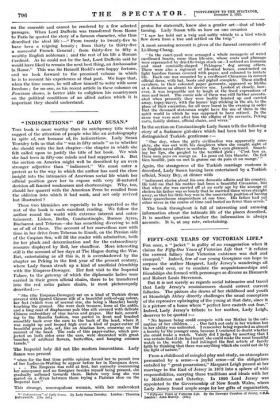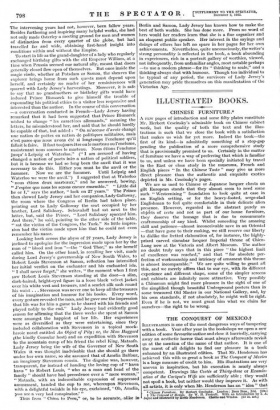FIFTY - ONE YEARS OF VICTORIAN LIFE.* Fon once, a " jacket
" is guilty of no exaggeration when it FIFTY-ONE YEARS OF VICTORIAN LIFE.* Fon once, a " jacket " is guilty of no exaggeration when it
claims for Fifty-One Years of Victorian Life that "it refutes the current fallacy that Victorian existence was dull and cramped." Indeed, few of our young Georgians can hope to surpass the author Margaret, Lady Jersey's wanderings all the world over, or to emulate the aequaintanceships and friendships she formed with personages so diverse as Bismarck and Robert Louis Stevenson.
But it is not merely as regards social intimacies and travel that Lady Jersey's reminiscences should correct current fallacies. The picture she draws of her childhood and youth at Stoneleigh Abbey directly challenges the usual conception
of the repressive upbringing of the young at that date, since it is a picture of a home where "perfect love casteth out fear."• Indeed, Lady Jersey's tribute to her mother, Lady Leigh, deserves to be quoted :— " No human being could compete with our Mother in the esti- mation of her children. . . . Our faith not only in her wisdom but in her ability was unlimited. I remember being regarded as almost a heretic by the younger ones, because I ventured to doubt whether she could make a watch. Vainly did I hedge by asserting that I was certain that if she had learnt she could make the most beautiful watch in the world. I had infringed the first article of family faith by thinking that there was anything which she could not do by
the light of nature." •
From a childhood of mingled play and study, an atmosphere permeated by a sense—a joyful sense—of the obligations entailed by "great possessions," Margaret Leigh passed at her
marriage to the Earl of Jersey in 1872 into a sphere of wide responsibilities, carrying these traditions and ideals with her to Middleton and Osterley. In 1890 Lord Jersey was appointed to the Governorship of New South Wales, where Lady Jersey found ample scope for her gifts of organization.
• Fifty-one Years of Victoria's .Life. By the Dowager Countess of Jersey, (.B-E, London : John hlun-ay. 1184.1 The intervening years had not, however, been fallow years. Besides furthering and inspiring many helpful works,. she had not only made Osterley a meeting ground for men and women of distinction from every quarter of the globe, but had travelled far and wide, obtaining first-hand insight into conditions within and without the Empire.
To start in life as the grand-daughter of a lady who regularly exchanged birthday gifts with the old Emperor William, at a time when Prussia seemed our nature/ ally, meant that doors generally closed flew open of themselves. But once inside the magic circle, whether at Potsdam or Samoa, the sheaves the explorer brings home from such quests must depend upon herself, and certainly no reader of her reminiscences will quarrel with Lady Jersey's harvestings. Moreover, it is safe to say that no grandmothers or birthday gifts would have induced Prince Bismarck to give himself the trouble of expounding his political ethics to a visitor less responsive and interested than the author. In the course of this conversation —a conversation conducted in French—Lady Jersey having remarked that it had been suggested that Prince Bismarck wished to change " les caracteres allemands," meaning the letters, he misunderstood her, and said that he should hardly be capable of that, but added : "On m'accuse d'avoir change une nation de poetes en nation de politiques militaires, main c'est parce que nous avons ete si longtemps r enclume qu'il fallait le faire. Ii faut toujours etre ou le marteau ou renclume, maintenant nous sommes le marteau. Nous &ions renclume jusqu' e Leipzig et Waterloo?' (" I am accused of having changed a nation of poets into a nation of political soldiers, but it is because we had so long been the anvil that it was necessary to do this. Either you must be the anvil or the hammer. Now we are the hammer. Until Leipzig and Waterloo we were the anvil.") I suggested that at Waterloo nous &ions deux marteatrx," and he answered, bowing, " J'espere que nous les serons encore ensemble." "Little did he or I," says the author, "look on 27 years." The Prince then showed Lady Jersey and her companion, Lady Galloway, the room where the Congress of Berlin had taken place, pointing out to Lady Galloway the scat occupied by her brother, Lord Salisbury. Schuvaloff had sat next to the latter, but, said the Prince, "Lord Salisbury squeezed him. And there," he said, pointing to the other side of the table, "sat the victim of the Congress, the Turk." So little impres- sion had the victim made upon him that he could not even remember his name.
Looking back across the abyss of 27 years, Lady Jersey is- inclined to apologize for the impression made upon her by the man of "blood and iron "—the "God Thor," as she herself called him. On the other hand, in recalling her visit, made during Lord Jersey's governorship of New South Wales, to Robert Louis Stevenson at Samoa, reflection has intensified her initial verdict on the enchanter and his enchanted isle. "I shall never forget," she writes, "the moment when I first saw Robert Louis Stevenson standing at the door—a slim, dark-haired, bright-eyed figure in a loose black velvet jacket over his white vest and trousers, and a scarlet silk sash round his waist. . . Stevenson was never one to keep all the treasures of his imagination and humour for his books. Every word, every gesture revealed the man, and he gave one the impression that life was for him a game to be shared with his friends and played nobly to the end." Lady Jersey had evidently good reason for affirming that the three weeks she spent at Samoa were amongst the happiest of her life. Her experiences were as diversified as they were entertaining, since they included collaboration with Stevenson in a topical mock- heroic novel entitled An Object of Pity; or, the Man Haggard (the kindly Consular host) and an expedition with Stevenson to the mountain camp of his friend the rebel King, Mataafa. Lady Jersey being the wife of the Governor of New South Wales it was thought inadvisable that she should go there under, her own name, so she assumed that of Amelia Balfour, an imaginary Stevenson cousin. The disguise was, however, transparent, for instead of handing the loving cup of " kava- kava " to Robert Louis, "who as a man and head of the family" should have had precedence over a "mere woman," " llfataafa, with an indescribable expression of suppressed amusement, handed the cup to me, whereupon Stevenson, with a delightful twinkle in his eye, exclaimed, 'Oh, Amelia, you are a very bad conspirator.'" Thus from "China to Peru," or te be accurate,- alike in Berlin and Samoa, Lady Jersey has known how to make the best of both worlds. She has done more. From no word of hers would her readers learn that she is a fine organizer and an eloquent public speaker. Her interest in the sayings and doings of others has left no space in her pages for her own achievements. Nevertheless, quite unconsciously, the writer's strong personality is reflected in the book, a book abounding in experiences, rich in a portrait gallery of worthies, viewed, not infrequently, from unfamiliar angles, most notable perhaps —to use a modern phrase—for its "thinking to scale," and a thinking always shot with humour. Though too individual to be typical of any period, the survivors of Lady Jersey's generation may pride themselves on this manifestation of the Victorian Age.







































































 Previous page
Previous page